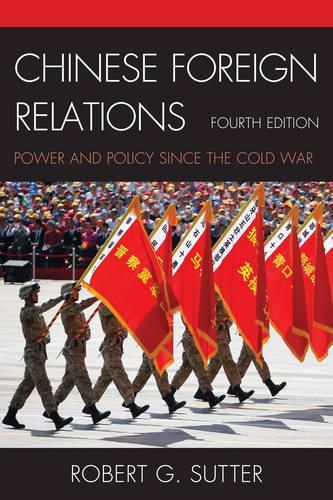Readings Newsletter
Become a Readings Member to make your shopping experience even easier.
Sign in or sign up for free!
You’re not far away from qualifying for FREE standard shipping within Australia
You’ve qualified for FREE standard shipping within Australia
The cart is loading…






Displaying new assertiveness and prominence, China under President Xi Jinping is rightly considered an emerging superpower backed by growing economic and impressive military strength. But this is only part of the story of China’s rise. As Robert G. Sutter shows in this meticulous and balanced assessment, the record of twists and turns in Chinese foreign relations since the end of the Cold War highlights a very different perspective. Domestic problems, nationalism, and security concerns continue to preoccupy Beijing, complicating China’s influence and innovations in foreign affairs. On the international front, the actions of China’s neighbors and the United States and China’s growing dependence on the world economy complicate and constrain as well as enhance China’s advance to international prominence.
Providing a comprehensive introduction to Chinese foreign relations, Sutter shows China exerting growing influence in world affairs but remaining far from dominant. Facing numerous contradictions and tradeoffs, Chinese leaders-even the self-assured Xi Jinping-avoid major confrontations with powerful competitors and eschew the costly commitments associated with regional and global leadership.
$9.00 standard shipping within Australia
FREE standard shipping within Australia for orders over $100.00
Express & International shipping calculated at checkout
Displaying new assertiveness and prominence, China under President Xi Jinping is rightly considered an emerging superpower backed by growing economic and impressive military strength. But this is only part of the story of China’s rise. As Robert G. Sutter shows in this meticulous and balanced assessment, the record of twists and turns in Chinese foreign relations since the end of the Cold War highlights a very different perspective. Domestic problems, nationalism, and security concerns continue to preoccupy Beijing, complicating China’s influence and innovations in foreign affairs. On the international front, the actions of China’s neighbors and the United States and China’s growing dependence on the world economy complicate and constrain as well as enhance China’s advance to international prominence.
Providing a comprehensive introduction to Chinese foreign relations, Sutter shows China exerting growing influence in world affairs but remaining far from dominant. Facing numerous contradictions and tradeoffs, Chinese leaders-even the self-assured Xi Jinping-avoid major confrontations with powerful competitors and eschew the costly commitments associated with regional and global leadership.